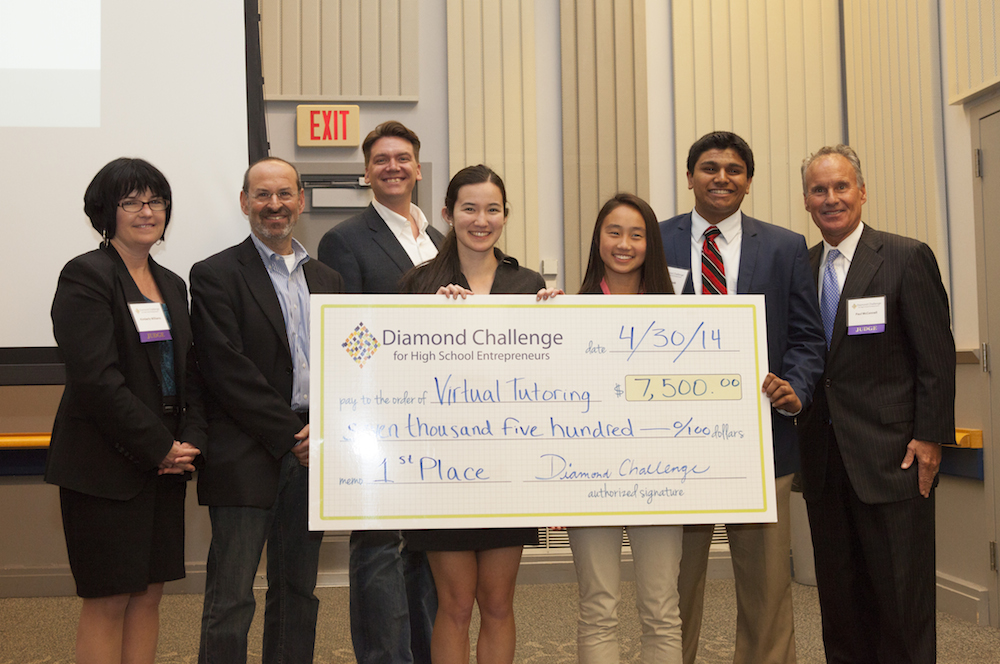Exposing young people to careers in entrepreneurship at a young age is becoming increasingly popular in high schools and college business programs.
The Diamond Challenge, a real-world business concept competition run by the University of Delaware’s Horn Program in Entrepreneurship, seeks to do just that.
Now in its third year, high school students from Delaware, Maryland and abroad are gearing up to participate in this year’s program by forming teams, brainstorming startup concepts and finding a teacher to advise them.
I feel like I’m moving ahead in life. I can identify a problem and actually do something about it.
“The goal of the Diamond Challenge — it’s an educational program looking to inspire and empower youth to look at entrepreneurship as a full-time career path,” said Julie Frieswyk, the Horn Program’s external programs coordinator. “It’s a different type of arena for students to showcase their skills.”
Registration for this year’s program opened in early September. Registration, for teams of two to four students per team, is on a first come, first served basis and ends in December or when the program’s capacity is met.
Register now
After registering, teams participate in a video curriculum that teaches them a modern approach to entrepreneurship, Frieswyk said. Students are taught to apply the scientific method — make a hypothesis, test and get evidence — to potential business ideas.
Students are challenged to create a solution to a problem, whether it’s local, regional or global.
Students who are registered must submit their concept by Dec. 15. In early 2015, teams compete in preliminary pitch rounds — held at various sites throughout Delaware and Maryland, as well as in Kenya, Moldova, Tunisia and Georgia.
On April 30, ten finalists will present their business concept at the Youth Entrepreneurship Summit at the University of Delaware. Three winning teams receive funding — $7,500, $5,000 and $2,500, respectively — that they can use to fund their business or pay tuition, Frieswyk said.
###
Last year’s winning team — comprised of Archmere Academy students Devon O’Dwyer, Payas Parab and Raylin Xu — won the competition with their pitch for an online tutoring system.
“There was a lack of peer tutoring programs and ours at the school wasn’t utilized very well,” O’Dwyer, a senior, said. “There were only tutors during the day. With the online program, you could sign up to be a tutor or sign up to be tutored, and the program would match you. You can use Skype and do it virtually.”
The team created a basic prototype of the website for the competition. They also surveyed students, teachers and administrators at their school in Claymont, as well as at other private schools in the area. The idea: if it works at Archmere, the team could sell the program to other schools.
I’m glad I got connected into this world to see what it’s all about — startups and entrepreneurship. It gives you more confidence.
The trio hired a designer to create a website, that, in the very near future, O’Dwyer said, will be matching tutors online at Archmere.
The winning students said they likely won’t pursue this particular project after graduation, but were thankful they had the space and resources to make it happen as high school students.
“The experience of developing it and doing it at a young age has been really powerful,” O’Dwyer said. “I feel like I’m moving ahead in life. I can identify a problem and actually do something about it. It led me to being so passionate about this challenge in general.”
Parab, also a senior, said the challenge was the first of many steps he’s taking to fulfill his career. He hasn’t decided on which college to attend yet, but said he knows he wants to study business management and entrepreneurship.
“This was a different kind of challenge. Creating a business concept — I never saw anything like that,” Parab said. “I’m glad I got connected into this world to see what it’s all about — startups and entrepreneurship. It gives you more confidence with your ideas and that you can build off them.”
O’Dwyer and Parab are both Diamond Challenge ambassadors; they get the word out about the program by visiting local schools and using social media to talk about their experiences as challenge participants.
That’s not hard for either of them.
“I never had a formal entrepreneurial class. The video curriculum — that in itself was eye-opening,” O’Dwyer said. “We had to formulate a written pitch, give a speech and be convincing about it — it’s not an opportunity you get every day. It helped my confidence.”







